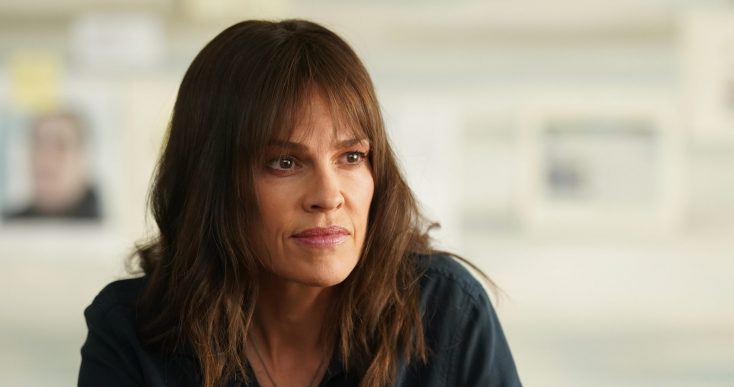By JUDY SLOANE
Front Row Features
HOLLYWOOD-Two-time Academy Award-winning actress Hilary Swank (“Boys Don’t Cry,” “Million Dollar Baby,) stars in the new ABC drama “Alaska Daily,” created by Tom McCarthy (“Spotlight” which won the Academy Award for Best Picture in 2016.)
Swank portrays Eileen Fitzgerald, a successful investigative journalist who is forced to leave her high-profile job in New York after a fall from grace. Moving to Anchorage, she joins a metro newspaper in the hope of finding redemption.
Executive Producer/Star Hilary Swank, and Executive Producer/Creator Tom McCarthy joined the TV Critics Association to discuss their new venture, which premieres on October 6, 2022, at 10:00 p.m. ET/PT.
Q: When you started working on this series, what made you want to address the crisis of missing and murdered Indigenous women as the centerpiece of your story?
Tom McCarthy: One of the reasons I decided to set the show in Anchorage was a piece of reporting by Kyle Hopkins, who wrote a series in conjunction with the Anchorage Daily News and ProPublica. [It] took a hard look at the missing and murdered persons’ crisis. I just felt to set a journalism show in Alaska and not take some time to examine that would be almost negligent, that it was a terrific opportunity to put such an important topic onto mainstream TV and maybe start a conversation with the “Lower 48” specifically, as the Alaskans like to refer to us.
Q: Hilary, were you inspired to watch “Spotlight” again just before you started this? And, Tom, were there certain elements of “Spotlight” that you wanted to come back to in “Alaska Daily” and maybe emphasize a bit more?
Hilary Swank: No, I didn’t need to watch it again. It was already seared in my brain how great it was and what an impression it made on me, just solidifying Tom’s work in my eyes. From “Station Agent” on, he had me hooked. And also, you want to take your own take on things and not try and bring something like that into your work, and let it be its own character and breathe its own life.
McCarthy: I didn’t know Hilary didn’t watch it again, and I’ll speak to her later about that. (he laughs)
I honestly felt like “Spotlight” was such a specific type of film, very much procedural. I didn’t have a lot of real estate to get to peek into the lives of the reporters, and I think when I had an opportunity to delve into this world again, that’s really what I wanted to explore. I really need to understand not only the work that journalists do, but who they are and what drives them, what makes them tick, and why is their work so important, not just to our communities and our country but the world at large.
Q: Hilary, what was it about this project that made you interested in doing TV again?
Swank: (Tom) had told me about this article “Lawless,” and I read it, and I was all consumed. It is material that matters. To me, it doesn’t really matter the medium where it’s told. I like all mediums, and I watch all mediums, and I’m not opposed to being a part of all mediums as long as they’re telling messages and entertaining people along the way.
I had learned about the missing Indigenous women about six months before I spoke to Tom. I was so angry and so horrified that this is happening. To me, when you can learn something while you watch something, [and] you can be entertained, it’s the best of all worlds.
Q: Tom, is there something specific about journalism that you want to highlight in this series?
McCarthy: Yeah, the significance of this show is local reporting. And that’s something I wanted to drill down on and why it’s important, why it matters. These small papers in many ways identify the kind of personality and the identities of these communities. I feel like that’s really important, as we’re losing that and people are getting funneled off into online sites and news sites. We’re losing the ability to have these conversations locally. So that’s something I really wanted to focus on.
Q: What was it about your character, Eileen Fitzgerald that drew you to this part?
Swank: I love people, and I love what makes them tick, and I love people who persevere through adversity. I love outsiders. I love the underdog. And at the heart of these stories, everyone wants to be seen, and everyone deserves justice.
I think a lot of the roles that I choose have that theme in one way or another, and I feel like Eileen Fitzgerald is an investigative truth seeker. She wants to make sure that justice is done and that people see the truth in situations and people who are corrupt. And I feel [an] alliance with what people in the world want right now. People don’t want to be lied to anymore. All the systemic stuff that we’re seeing come out, it’s horrifying; but it’s also a blessing because we’re able to start doing something about it.
Q: Tom, What is your commitment to this series? Are you working on other projects or are you sticking with this?
McCarthy: I’m sticking with it. When I had this idea way long ago, I was like, “Oh, I’ll come up with this little idea, and I’ll launch it.” But lo and behold, you always fall in love with your projects if they’re meaningful, and I think this is meaningful. I’ve really fallen in love with not just what the show represents, but the people working on it.
There hasn’t been a show about the news on TV in a long time, specifically about papers, probably not successfully, in my eyes, since “Lou Grant.” So it’s a tall order, but I think it’s a really exciting challenge.






